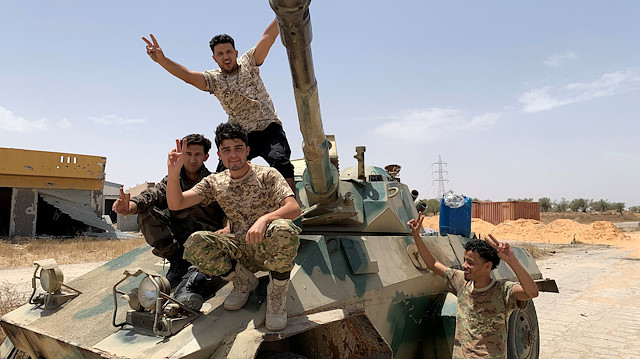
The increasing number of mercenaries, who are mobilizing to support Haftar’s self-declared LNA in Sirte, indicates Haftar’s backers are repositioning themselves on the front line for maximum advantage
By Ferhat Polat
- The writer is a researcher at the TRT World Research Centre
Over the past two months, there has been a drastic change on the ground in Libya as forces loyal to the internationally recognized Government of National Accord (GNA) have pushed Haftar’s self-declared Libyan National Army (LNA) to the borders of the coastal city of Sirte, some 450 km east of Tripoli, and Al-Jufra airbase in central Libya.
Since January this year, Turkey has intervened determinedly in the Libyan conflict, providing air support, weapons, and technical assistance to the UN-backed government, and this Turkish support has recently enabled a series of victories for the GNA forces to the detriment of Haftar’s LNA and his backers, namely the United Arab Emirates (UAE), Egypt, Russia and France.
Now, the UN-backed forces are advancing on Sirte, the gateway to the east of the country and oil fields.
Sirte seems to be crucial for the legitimate Libyan government for two reasons. First, Sirte has significant economic value as a gateway to Libya’s oil crescent region, consisting of vital ports such as al-Zuweytinah, Ra’s Lanuf, Marsa al Brega, and as-Sidr, which reportedly [1] supplies 60% of Libya's oil exports. Secondly, it is a strategic city that could enable the GNA to take control of the Libyan coastline from the capital to the west and Benghazi to the east.
Since Wagner, a private paramilitary contractor from Russia, reportedly [2] helped Haftar’s militias seize Libya’s largest oil field last week. Russian cargo planes have been constantly flying between a Russian air base in Syria and Libya. Over the last weeks, the U.S. military officials have said [3] these Russian flights could be transferring weapons shipments and thousands of foreign mercenaries linked with militias loyal to Haftar, who are moving towards Sirte to enhance the fighting force of the warlord as he fervently seeks to keep his eastern stronghold.
The battle over the control of Libya’s oil resources is a primary driver for some countries currently engaged in the conflict. Libya’s fragmentation at political and security levels has effectively led to an open fight for the country’s energy resources. Oil revenues have been, and remain, at the core of the conflict.
According to a Wall Street Journal report [4], mercenaries linked to Wagner have joined forces with Haftar’s militias to maintain the El-Sharara oil field, Libya’s largest, which produces over 300,000 barrels of crude oil per day, approximately one-third of the oil-rich country's production.
In response to recent developments, the spokesperson of the UN-backed forces stated [5] that the “liberation” of Sirte and Jufra from Khalifa Haftar’s militias had become “more urgent than ever” for the GNA following the deployment of mercenaries in the country.
Russia has used Libya’s civil war to exert further influence on Europe’s southern border and have access to Libya’s oil and gas. It seems that Russia has been filling the vacuum left by NATO to further its benefits regardless of the cost that its moves bring to international peace and stability.
Recently, France accused [6] Turkey of criminal responsibility in Libya, but Turkey seems to have a reasonable position in Libya, and apparently Ankara is the only actor whose presence in the country is justified under international law, not least there is a formal security cooperation between Turkey and the UN-backed government. Besides, Turkish support to the GNA is regarded in a positive light by a a large number of Libyans.
Yet France’s approach towards the Libyan conflict seems to undermine NATO’s position in Libya and the Eastern Mediterranean. Until now, France’s stance towards the two main parties within Libya has been one of utter ambiguity. While giving lip service to the UN-backed government, Paris has, over the past years, closely collaborated [7] with Haftar, even neglecting the security concerns that arise from Russia's increasing influence in the region with Haftar as its proxy.
Recently, Turkish Foreign Minister Mevlut Cavusoglu said [8] "NATO sees Russia as a threat on the one hand, but NATO-ally France is trying to increase Russia's presence in Libya on the other."
Paris is still paying lip service to the UN-led peace process while actively trying to undermine it. As a result, it is causing a great divide within the international community and making it harder and harder for any credible diplomatic effort toward ending the conflict in Libya to take hold.
Ghassan Salame, the United Nations’ former Libya envoy, slammed [9] the hypocrisy of the members of the UN Security Council over the support given to Haftar against the UN-backed government, because when the warlord began his offensive last year in April, Salame said, “he had most of them supporting him”.
The increasing number of mercenaries, who are mobilizing to support Haftar’s self-declared LNA in Sirte, indicates that Haftar’s backers are repositioning themselves on the front line for maximum advantage. They seem to be prepared to protect their economic and political interests in eastern Libya and oil resources east of Sirte. The UN-backed government forces, on the other hand, seem to be determined to liberate the city as they consider Sirte as a focal point for the mercenaries, whose existence in the country serves nothing but to fuel more conflict and cause greater destruction.
* Opinions expressed in this article are the author’s own and do not necessarily reflect the editorial policy of Anadolu Agency.


